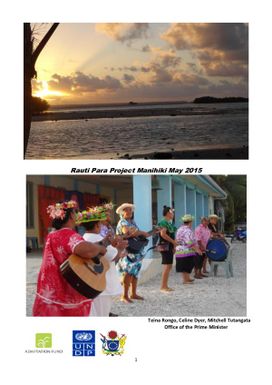Rauti para tablet training project, Rakahanga and Manihiki
- Description:
- The legend of Maui who fished the atoll of Manihiki is a popular folklore that the people of Manihiki like to depic t, sing and dance about as a reminder of their beginnings. The people of Rakahanga and Mani hiki tell stories when Rakahanga was the main settlement and people travelled to and fro between the two islands mainly to forage for food on Manihiki. However, this practice was discouraged by the missionaries because canoes were getting lost at sea, and so they encouraged the people to settle permanently on the two islands.
- Display date:
- 2015
- Collections:
- Secretariat of the Pacific Regional Environment Programme (SPREP)
- Publisher:
- Office of the Prime Minister
- Content partner:
- Secretariat of the Pacific Regional Environment Programme (SPREP)
- Availability:
- Not specified
-
Copyright status: All rights reservedFind out more about what you are able to do with this itemThis item is all rights reserved, with means you'll have to get permission from Secretariat of the Pacific Regional Environment Programme (SPREP) before using it. For more information, please see our use and reuse page.What can I do with this item?Non-infringing useNZ copyright law does not prevent every use of a copyright work, and this item may be hosted by an international institute or organisation. You should consider what you can and cannot do with a copyright work.No sharingYou may not copy and/or share this item with others without further permission. This includes posting it on your blog, using it in a presentation, or any other public use.No modifyingYou are not allowed to adapt or remix this item into any other works.No commercial useYou may not use this item commercially.
Welcome and warm Pasifik greetings
The information on this site has been gathered from our content partners.
The names, terms, and labels that we present on the site may contain images or voices of deceased persons and may also reflect the bias, norms, and perspective of the period of time in which they were created. We accept that these may not be appropriate today.
If you have any concerns or questions about an item, please contact us.

